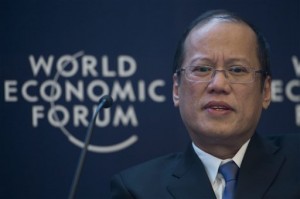
Benigno Simeon Aquino III, President of Philippines, speaks during the 43rd Annual Meeting of the World Economic Forum, WEF, in Davos, Switzerland, Friday, Jan. 25, 2013. (AP Photo/Keystone/Jean-Christophe Bott)
ZURICH – Pres. Benigno Aquino III is still unconvinced that the Philippines should overhaul its Constitution to boost the country’s economic standing.
In a chat with visiting Philippine media at the sidelines of the recently concluded World Economic Forum annual meeting in Davos, Aquino said what is important is if the current fundamental law of the land was serving Filipino interest.
“Bago natin gawin, pakita naman ’yung, parang may concrete na ebidensya na makakatulong sa bansa natin. (Before we do it, it has to be established with concrete evidence that this will benefit our country),” he said.
The President suggested that pursuing charter change (Cha-Cha) if only to qualify for the Trans-Pacific Partnership (TPP) trade agreement, as some US businessmen recently suggested, was not in the horizon.
There are 11 countries currently involved in the US-led TPP negotiations, including Australia, Brunei, Chile, Malaysia, New Zealand, Peru, Singapore, Vietnam, Canada and Mexico. This is a framework to reduce or eliminate tariff and non-tariff barriers on trade and investment, covering industrial and agricultural goods, textiles, and apparel. This comprehensive agreement will also address intellectual property protection, trade in services alongside new issues involving competitiveness and the treatment of state-owned enterprises.
In the first place, Aquino said the convenors of TPP had started reviewing the proposed agreements before inviting others and that the Philippines had yet to be invited to the pool.
But some US businessmen have been lobbying for the Philippines to be part of the proposed TPP.
“Kapag inimbita tayo, may certain qualifications na kailangan gawin —I’m not saying na tama ‘yung sinasabi nitong ng mga businessmen na ito, but napakalayo pa ng prosesong ‘yun (If we’re invited, there are certain qualifications to meet. I’m not saying that what these businessmen are saying is right but it has to go through a long process),” Aquino said.
“Tapos para bang—yung Constitution natin, parang importante yata i-serve ’yung interes natin, manigurado muna tayo (na) nase-serve ’yung interes natin bago ‘yung interes ng mga hindi natin kababayan (Then, with regards to our Constitution, it’s important that it serves our interest, to make sure it serves our interest before the interest of foreigners),” he said.
The President suggested that the Philippine domestic economy was already on a robust path – posting a growth of 7.1 percent for the third quarter 2012 figure and 6.5 percent average growth for the first three quarters of 2012 – without the Cha-Cha.
“Nobody has demonstrated with absolute certainty that if we overhaul the Constitution, we’ll have corresponding economic gain,” Aquino said.
“Medyo ‘yung mga nagre-request sa atin, hindi naman yata naabot ‘yung same numbers na ‘yan. Hindi naman sa nagyayabang. (Those countries requesting us to change the Constitution, they don’t even hit the same pace of GDP growth. This is not to brag,” he added.
Many economists and analysts favor a review of the Constitution to repeal restrictive economic provisions, citing an urgent need to keep up with a globalizing environment and signal to the world that the Philippines is very much open for business. The areas often proposed to be liberalized include mass media and advertising, land ownership, educational institutions, utilities and natural resources.
“Now, can I just point out: on economic provisions on land ownership, for instance. In China, you can’t even own land; you can only lease land on a long-term basis. But for a decade, they were growing at 10 percent,” he said.
During last week’s US-Philippines Society forum before the President left for Switzerland, Philippine Ambassador to the US Jose Cuisia Jr. said a visiting US delegation talked to the President about foreign ownership limits under the Philippine Constitution.
The Foundation for Economic Freedom, a group of prominent economists, was also among those urging Aquino to study the merits of Cha-Cha, saying that the repeal of restrictive economic provisions were urgently needed to finally bring the Philippines to shift to an investment-led from a remittance-reliant growth.
In an open letter to the President dated July 13, the Foundation for Economic Freedom said that the Philippine economic growth had been propelled by consumption spending, mainly due to remittances of overseas Filipino workers and not by any action of the government.
“We want our growth transformed from a consumption-driven one to an investment-driven one because only an investment-driven growth will grow jobs and reduce unemployment, increase productive capacity, improve competitiveness, and put the country on a higher plane of sustainable growth,” said the FEF president signed by the group’s president Calixto Chikiamco.
FEF president Calixto Chikiamco, in an earlier interview with the Philippine Daily Inquirer, said unlike in the previous administrations where there were always suspicions about motives, the current regime had a chance to seek these reforms. “Timing is right because [Aquino] enjoys high trust rating and there’s no fear he will use Cha-Cha to extend his power,” Chikiamco said. “Moreover, globalization has made liberalizing economic provisions in the Constitution more obvious and urgent.”